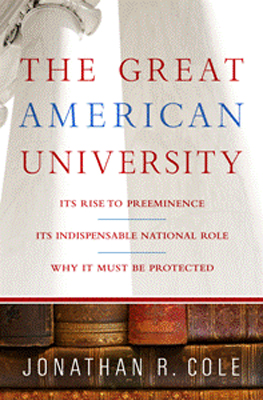| Sun | Mon | Tue | Wed | Thu | Fri | Sat |
|---|---|---|---|---|---|---|
| 1 | 2 | 3 | 4 | 5 | ||
| 6 | 7 | 8 | 9 | 10 | 11 | 12 |
| 13 | 14 | 15 | 16 | 17 | 18 | 19 |
| 20 | 21 | 22 | 23 | 24 | 25 | 26 |
| 27 | 28 | 29 | 30 | 31 |
CATEGORIES
RECENT ENTRIES
BLOG ROLL
The Great American University (guess who?)
Holding a panel discussion at U of C entitled “The Great American University: The University of Chicago as an Ideal Type" might seem rather pompous. Yet when a campus outsider writes a book extolling Chicago as one of the nation’s superlative universities, a discussion makes sense. That event took place last Wednesday when Jonathan R. Cole, the John Mitchell Mason professor and former provost and dean of faculties at Columbia University, came to campus to speak about his book The Great American University: Its Rise to Preeminence, Its Indispensable National Role, Why It Must be Protected (PublicAffairs, 2010).
The University of Chicago story is often told as one of an upstart: a scrappy,  Midwestern institution that in a few short decades rose to the preeminence of East Coast universities founded 100 to 200 years earlier. Yet Cole tells a different story that begins long after Chicago’s 1892 founding. According to him, the “great American university,” one propelled by academic freedom and meritocracy, truly began with the demise of another great higher-education system: Germany’s.
Midwestern institution that in a few short decades rose to the preeminence of East Coast universities founded 100 to 200 years earlier. Yet Cole tells a different story that begins long after Chicago’s 1892 founding. According to him, the “great American university,” one propelled by academic freedom and meritocracy, truly began with the demise of another great higher-education system: Germany’s.
Adolph Hitler’s rise to power in January 1933 resulted in an exodus of talent from the top German institutions. Hundreds were dismissed for being Jewish or having political views at odds with the Nazi party. Others, like James Franck, who later came to the University of Chicago and worked on the Manhattan Project, resigned from the University of Göttingen in protest. America was by far the greatest beneficiary of Germany’s loss. As a result, Cole writes, “American research universities were poised to become the greatest in the world.” Germany had intentionally violated both academic freedom and meritocracy—values Cole finds in every great system of research and higher education since 17th-century Europe.
Among American institutions, he says, the University of Chicago most epitomizes those principles. Faculty panelists joining Cole were clearly appreciative of his assessment, yet they didn’t hesitate to delve deeper into the academic-freedom point. Chemist Stephen Berry, the James Franck distinguished service professor emeritus, attributed Chicago’s encouragement of free inquiry to its interdisciplinary culture, citing “permeable departmental divisions” in many, but not all, disciplines. Historian John Boyer, AM'69, PhD'75, dean of the College, acknowledged Cole’s recognition of Robert Maynard Hutchins as “the champion of academic freedom before and during the Cold War,” but added the caveat that the man viewed as “fearless to the outside” was often seen as “reckless to the inside” by faculty who saw his abolition of tenure as a threat to academic freedom. Anthropologist Richard Shweder, the William Claude Reavis distinguished service professor of human development, concluded the session expressing concern that the University is walking a thin line by expanding the role of institutional review boards, technology-transfer initiatives, and offices of risk management, all of which have the potential to restrict research.
During the Q&A, several attendees commented on the relative merits of the University and other institutions, as well as American versus European universities. Appropriately enough, president emerita Hanna Holborn Gray, present as a guest, ended the event by questioning the book’s premise, deconstructing the conversation, and commenting on the self-congratulatory nature of the phrase “great American university.”
Kyle Gorden, AB’00
RELATED READING
Racing scholarly values leads author to Chicago (University of Chicago News Office)
Interview with Cole: Great American Research Universities and How They Got That Way (Columbia Record)
"Can American Research Universities Remain the Best in the World?" (The Chronicle of Higher Education, January 3, 2010)
"University of Chicago, a Bright Spot for the City" (The New York Times, January 9, 2010)
March 8, 2010
